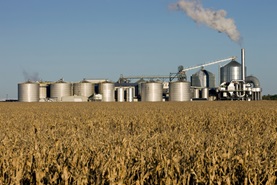ESG Impacts of the War in Ukraine: Global Food Supply
The invasion of Ukraine highlights the fragility of the global food system. The destruction caused by the war and subsequent trade restrictions on Russia, endangers a significant percentage of the global food supply coming from two of world’s leading agricultural commodity exporters, consequently prompting food prices to surpass the 30-year high.
Biodiversity loss and climate change call for a nature-positive economy – Stewardship may lead the way
Financial institutions funding the supply chains affected by biodiversity loss stand to lose right alongside farmers, producers and retailers—and so, in turn, do investors. ESG stewardship continues to be a powerful investor instrument to mitigate risks on a changing planet. With growing expectations of double materiality, it is an opportunity for investors to have a greater societal impact and support the transition towards a nature-positive economy.
High-Impact ESG Issues: What Your Company Needs to Know
All companies are affected by material ESG issues. Poor management of these issues can negatively impact a company’s operations, employee retention, community relations, and ultimately its share price. Learn which ESG issues cut across industries and how companies can address the most impactful MEIs affecting them.
The Emergence of Water Risk: From Marginal to Systemic
The past two decades have seen a surge in interest in environmental issues, mainly climate change, global warming, and fossil fuels. Yet, another equally important dimension - water scarcity - has thus far remained largely unexamined and has not been given adequate importance in the economic development agendas of many countries.
Mass Timber in Construction - Big Buildings, Smaller Carbon Footprint
As an innovation in the industry, mass timber construction emits significantly less carbon than traditional concrete and metal structures, while modular construction ensures usability across many building types. This article reviews some of the concerns over structural strength, fire safety, regulatory compatibility, cost savings and the sustainability of increased forestry. It then examines current mass timber buildings and projects and looks at their viability as an alternative material for the future.
ESG Implications of Russia’s Invasion of Ukraine on the Chemicals Industry
The Russian invasion of Ukraine not only threatens global security, but it also raises some important ESG implications for several sectors, including the chemicals industry and particularly the agrochemical subindustry, as Russia exports over 10% of fertilizers globally.
Looking at ESG in Crypto, Blockchain, and Public Equities
Beyond the volatile crypto market, blockchain has several features that lend well to commercial applications. Blockchain can help improve the transparency, speed and efficiency of data transfers and monetary transactions. Businesses in multiple industries are using blockchain tools to enhance payment platforms and secure supply chain management systems. Sustainalytics’ latest Thematic Research report, An ESG Lens on Blockchain and Public Equities, surveys ESG risks and opportunities related to applications of blockchain technology that are being developed by listed companies across multiple sectors of the economy.
Russia, ESG Risks in Energy, and Corporate Citizenship
As the unprecedented situation in Ukraine continues to unfold, Russia’s energy industry has remained remarkably untouched by the waves of sanctions currently being deployed against the country, despite being arguably its most important sector. While the European Union and its allies have been cautious to avoid disrupting energy flows (unlike how sanctions are currently disrupting the flow of capital), international oil companies are responding to the crisis in their own capacity.
Key Themes Shaping Proxy Voting in 2022
As the volume and breadth of ESG risk exposure continue to rise, the stage is set for another momentous proxy season. The trending topics of last year will continue to steer the agenda—with the prospect of even more substantial support from shareholders in 2022.
The Sustainability Conundrum of Living Income in Agriculture
Living Income is a crucial consideration among leading companies across some sectors and their supplier companies throughout the agricultural and food supply chain. Companies that manage ESG risk in their supply chains, making targeted investments to improve their resilience, are better positioned to build investor confidence.
Answering the Call for Progress: How Companies Can Respond to Investor Demands on DEI
In this blog post we share what companies can do to communicate their progress on diversity, equity, and inclusion (DEI) to investors and other key stakeholders, particularly with respect to gender diversity and advancing women’s socio-economic status.
EU Taxonomy in Limbo - Reporting Alignment of Article 8 and 9 Funds in 2022
For observers of the EU’s Sustainable Finance Strategy, 2022 kicked off with a crack and a bang as the European Commission went ahead with plans to include natural gas and nuclear-related activities as potentially sustainable under their ‘Green Taxonomy’. However, in midst of this furor, seemingly less attention has been paid to other components of the regulation that have quietly taken effect from the 1st of January 2022, presenting their own set of challenges.
The ESG Risks of National Oil Companies Taking Over Fossil Fuel Production from International Oil Majors
As growing pressure to cut GHG emissions is causing Western oil majors to sell their high-carbon assets, it is expected that National Oil Companies (NOCs) will pick up some of the production. For investors holding an interest in or considering investing in NOCs or sovereign debt, it is worth assessing how fossil fuel production shifts will impact their portfolio’s alignment with climate ambitions and ESG values.
What Happens When Companies are Receptive to Investor Feedback on ESG?
When companies are receptive to investor feedback, there are clear real-world impacts and positive changes. Such engagement outcomes vary and are directly tied to the company and its company-specific exposure to material ESG issues.
Maximum Impact: How Bond Impact Reporting Can Improve Corporate Decision Making
When companies measure and report the environmental and social impacts of their operations, they can demonstrate to investors large and small that their green and social bonds are reliable investments for maximum impact. Then investors can optimize their portfolios for impact as they do for risk and reward and companies can optimize their efforts to improve.
Measuring What Matters: Initiatives for Banks' Climate-Related Impact and Disclosure
To help financial institutions examining the climate impact of their portfolios, we’ve compiled a list of the initiatives and organizations offering guidance on the collection, measurement, and disclosure of climate-related financial data.




















